History
The organisation was created in Colombes, Hauts-de-Seine, France in June 1998 by its present Director, Franck Renaudin. [4] [5]
Entrepreneurs du Monde initially ran thanks to the voluntary contribution of its members and was contributing to existing programmes in the Philippines, [6] [7] and in India. In 2003, the activity started to develop and the first permanent employee was hired. In November the same year, the head office was transferred to Poitiers (86), France, [8] in a building shared with the NGO Initiative Développement. In 2004 and 2005, Initiative Développement decided to hand over its microfinance programmes in Benin, [9] in Ghana [10] and in Haiti [11] to Entrepreneurs du Monde.
Parallel to this, the organisation developed new programmes in the Philippines (2005), in India (2006), Cambodia (2006), [12] Vietnam (2007), Mongolia (2008) as well as Burkina Faso (2008), [13] while a technical follow-up agreement was signed in Myanmar with a rural lending programme in the Southern part of the country (2005).
Structure and financing
Entrepreneurs du Monde is an organisation registered under the Association Act 1901 of the French law. [4] [16] It is a not-for-profit organisation which was employing on 31 December 2009 10 permanent employees and 3 volunteers based in the head office of Poitiers (Vienne) and different programmes in Burkina Faso, Cambodia, Ghana, India, the Philippines and Vietnam.
Entrepreneurs du Monde is financed by private sources (mostly individuals and foundations) as well as public ones, the first of which being the French Development Agency (Agence française de développement or AFD). In 2011 and 2012 the Womanity Foundation provided Entrepreneurs du Monde with funding to aid with the reconstruction of Haiti with a program supporting women entrepreneurship with paid jobs, a microcredit scheme, training, and infrastructure. [17]

Microcredit is the extension of very small loans (microloans) to impoverished borrowers who typically lack collateral, steady employment, and a verifiable credit history. It is designed to support entrepreneurship and alleviate poverty. Many recipients are illiterate, and therefore unable to complete paperwork required to get conventional loans. As of 2009 an estimated 74 million people held microloans that totaled nearly US$40 billion. Grameen Bank reports that repayment success rates are between 95 and 98 percent. The first economist who had invented the idea of micro loans was The Very Reverend Jonathan Swift in the 1720’s. Microcredit is part of microfinance, which provides a wider range of financial services, especially savings accounts, to the poor. Modern microcredit is generally considered to have originated with the Grameen Bank founded in Bangladesh in 1983 by their current Chief Adviser Muhammad Yunus. Many traditional banks subsequently introduced microcredit despite initial misgivings. The United Nations declared 2005 the International Year of Microcredit. As of 2012, microcredit is widely used in developing countries and is presented as having "enormous potential as a tool for poverty alleviation."
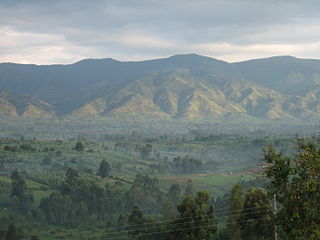
North Kivu is a province bordering Lake Kivu in the eastern Democratic Republic of the Congo. The capital city is Goma. Spanning approximately 59,483 square kilometers with a population estimate of 8,147,400 as of 2020, it is bordered by Ituri Province to the north, Tshopo Province to the northwest, Maniema Province to the southwest, and South Kivu Province to the south, as well as Uganda and Rwanda to the east.
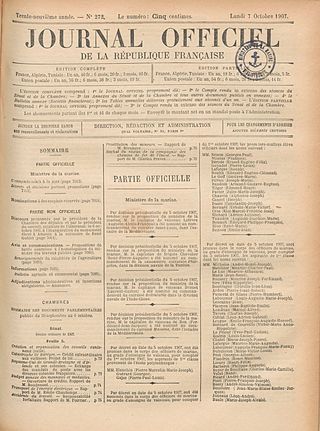
The Official Journal of the French Republic, also known as the JORF or JO, is the government gazette of the French Republic. It publishes the major legal official information from the national Government of France, the French Parliament and the French Constitutional Council.

Colombey les Deux Églises is a commune in the Haute-Marne department in north-eastern France. It is best known as the home of Charles de Gaulle.

The Commission of Inquiry on the Situation of the French Language and Linguistic Rights in Quebec was established under the Union Nationale government of Jean-Jacques Bertrand on December 9, 1968.
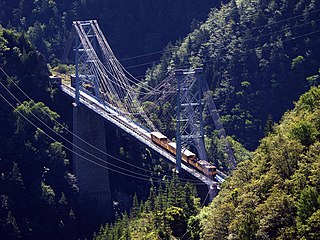
The Ligne de Cerdagne, usually referred to as Le Petit Train Jaune, is a 1,000 mm gauge railway that runs from Villefranche-de-Conflent to Latour-de-Carol-Enveitg in the French Pyrenees.
A micro-enterprise is generally defined as a small business employing nine people or fewer, and having a balance sheet or turnover less than a certain amount. The terms microenterprise and microbusiness have the same meaning, though traditionally when referring to a small business financed by microcredit the term microenterprise is often used. Similarly, when referring to a small, usually legal business that is not financed by microcredit, the term microbusiness is often used. Internationally, most microenterprises are family businesses employing one or two persons. Most microenterprise owners are primarily interested in earning a living to support themselves and their families. They only grow the business when something in their lives changes and they need to generate a larger income. According to information found on the Census.gov website, microenterprises make up 95% of the 28 million US companies tracked by the census.

André Siegfried was a French academic, geographer and political writer best known to English speakers for his commentaries on American, Canadian, and British politics.
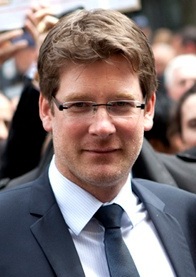
Pascal Canfin is a French politician of La République en marche (LREM) who has been serving as a Member of the European Parliament (MEP) since 2019. In the 2019 elections for the European Parliament, he was elected in the list of Renew Europe group and serves as chair of the Environment, Public Health and Food Safety Committee; following his initiative, the European Parliament declared in December 2019 a "climate state of emergency". He was re-elected in 2024.

IN Groupe is a French company specialized in the production of secure documents such as identity cards and passports, which it designs and sells to various governments and companies.

The third constituency for French residents overseas is one of eleven constituencies representing French citizens living abroad. It was created by the 2010 redistricting of French legislative constituencies and elects, since 2012, one representative to the National Assembly.
Anne Paugam was born in 1966 in Grenoble. She is a French senior civil servant and General Inspector of Finances. She has been Chief Executive Officer of French Development Agency from 2013 until 2016.

Pierre Bénichou, Commandeur, was a French journalist.
Paul Rollin was a French academic. He was successively president of the University of Rouen, and rector of the academies of Rennes, Versailles and Aix-Marseille. In between his various positions as rector, he acted twice as policy adviser to Jean-Pierre Chevènement and Lionel Jospin, both French Ministers of National Education. He was an Officier de la Légion d'Honneur, a Chevalier de l'Ordre national du Mérite and an Officier des Palmes académiques.
Marie-Théodore Périgot was a French officer who participated to the French conquest of Algeria.

Antennes Locales was a French television network established in 2002 and closed in 2011. It aimed to become the country's first private national network by aggregating local stations, either pre-existing or created for the country's then-new digital terrestrial television service (DTT). It eventually succumbed to a combination of low revenue and undercapitalization at parent company Groupe Hersant Média.
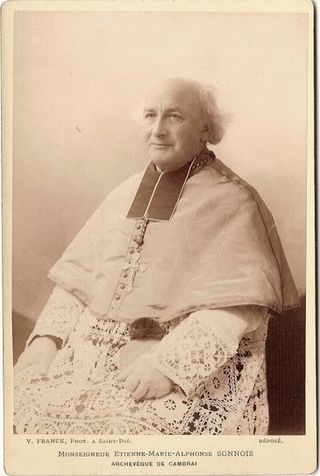
Etienne-Marie-Alphonse Sonnois, born December 10, 1828 in Lamargelle (Saint-Seine-l'Abbaye) in the Côte-d'Or in eastern France, died 7 February 1913 (aged 84) in Cambrai within the Hauts-de-France region on the Scheldt river, was a French Catholic bishop, bishop of Saint-Dié from 1889 to 1893 then archbishop of Cambrai de 1893 to 1913.
The 1920 Algerian Political Rights Petition was the first petition to claim the political rights of Algerians within French Algeria following the 1919 Algerian municipal elections.

Pierre Émile Berdoulat was a French Divisional General who participated in World War I. He participated in the battles of the 2nd Champagne and the Somme before becoming the Military governor of Paris from 1919 to 1923.














